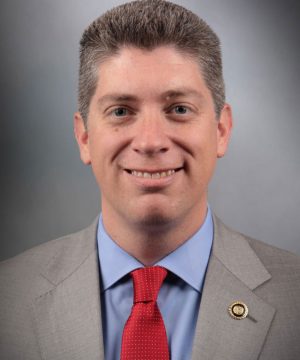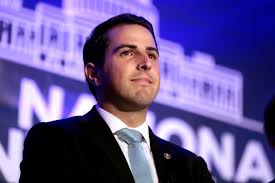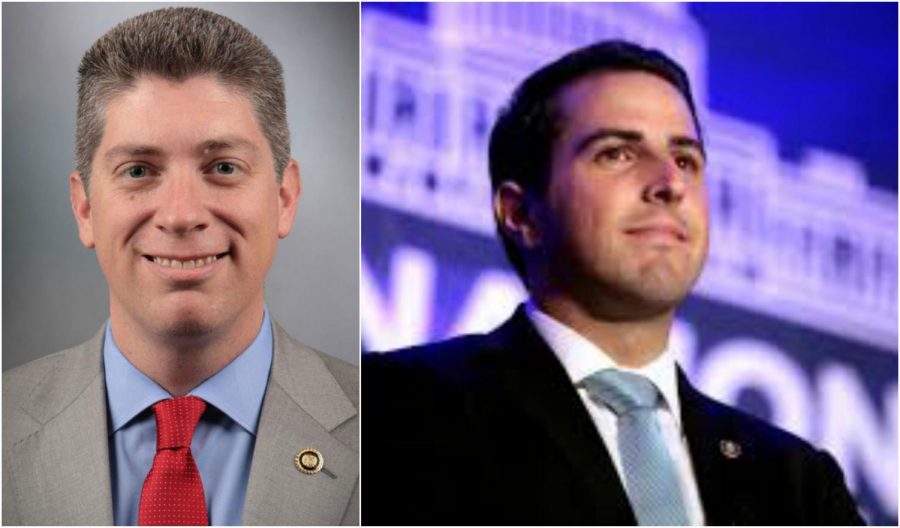Q&A with Bill Eigel and Phil Christofanelli
Published: March 22, 2018
 Bill Eigel- Republican Senator from Missouri Senate District 23
Bill Eigel- Republican Senator from Missouri Senate District 23
What have you accomplished so far as the vice chairman on the Board of Education?
“Well, probably the biggest accomplishment in education so far is that last year we fully funded the education formula for the first time in Missouri history.”
You’re on the General Law Committee, and they are considering a bill to repeal the death penalty. Can you tell me a bit about that?
“I have heard and resonated with the message on both sides of this issue. There’s one side that
believes that in order to enforce equal justice, if someone takes a life the only equal penalty they can face is the loss of their own life. On the other hand, folks that don’t believe in the death penalty point out very correctly, I think, that the death penalty is actually not the worst penalty one can suffer.”
How will the bill you sponsor that modifies provisions relating to charter schools affect your district?
“For a number of different reasons, there are laws like my proposal with charter schools to allow for additional choice, for parents to choose whether or not they think the traditional public schools like Francis Howell are good or if they’d like to have a more targeted educational experience like a charter school or some other type of choice program.”
Can you explain the bill being looked at by the General Law Committee that relates to hourly wage and how that bill will affect people?
“Generally I’ve been a proponent of free market and to have a more free market, if you don’t want government going in and mandating what employers have to pay employees. That should generally be the responsibility of a negotiation between employers and their employees. And generally, the market rate will be determined by the demand level and skill sets that the employee brings to the table. So, there are several bills here that will actually fully repeal the prevailing wage laws so we wouldn’t have a prevailing wage. We would just have the minimum wage. There are laws that modify the prevailing wage and scale back the extent to which prevailing wage is used in Missouri. I support each of those particular efforts because I don’t like the idea of government setting wage levels.”
There’s a bill to make the second Saturday in
October “Buy Missouri Week.” Can you explain what that is and why it should be established?
“This is the initiative that Lieutenant Governor [Mike] Parson is working on, and it’s basically an initiative to encourage folks around the state to buy goods and services from Missouri businesses.
So, the stronger that we can make the small businesses and the big businesses that are based out of Missouri, we want to do that. It keeps revenue, profits. It keeps economic growth right here in the Show-Me state.”
What bill are you currently working on that you feel will be most beneficial to your district?
“The Missouri Economic Relief Act. That is major tax cut legislation that I proposed back on Dec. 1. It would cut taxes for working and middle class households by eliminating the bottom bracket of the income tax code, and it would bring down the top rate of our income tax code from 5.9 percent, which is where it’s at now, all the way down to 5.2 percent.”
What are some of your long term plans for your district?
“We’re very fortunate here in St. Charles that we are one of the fastest growing areas in the state. So, one of the long-term goals I have is infrastructure here in St. Charles.”
 Phil Christofanelli- Republican member of the Missouri House of Representatives, from District 105
Phil Christofanelli- Republican member of the Missouri House of Representatives, from District 105
Can you describe the role that you play in the House of Representatives?
“I’m a state representative. I represent the 105 district, which includes Francis Howell North and about 37,000 other constituents.”
Describe your experience being the youngest member of the House of Representatives.
“I was 26 when I started, so sometimes I have a different perspective than my colleagues. Lots of them are at the ends of their careers, so I often have a different outlook on technology and similar matters.”
You’re sponsoring a bill relating to funding going to public schools. If it’s passed, how will this affect schools in the area?
“That bill was filed last year and it’ll be filed again this year. The foundations formula is somewhat
complicated. It’s like a math equation that will affect which schools get certain funding and where the money will go. My version of the funding formula goes back and eliminates some past provisions put in place, like the money that is payed to small schools to keep them small. It would take that money and give it to kids in schools that really need the extra funding, for students with disabilities, for example.”









![FHN's Rescheduled Prom At Old Hickory Country Club [Photo Gallery]](https://FHNtoday.com/wp-content/uploads/2025/04/IMG_9932-48-300x200.jpg)
![Varsity Boys Volleyball Fall Short Against FHC [Photo Gallery]](https://FHNtoday.com/wp-content/uploads/2025/03/IMG_0453-300x200.jpg)
![Girls Varsity Soccer Falls to Liberty High School [Photo Gallery]](https://FHNtoday.com/wp-content/uploads/2025/04/03.27_GirlsSoccer_JDelapaz-15-300x200.jpg)


